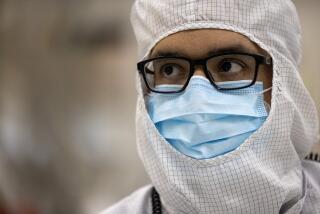Beating Swords Into Satellites : Space-based projects can provide meaningful, non-military work for dedicated students, an engineer says.
- Share via
After nearly 20 years in the military end of the aerospace industry, Ron Williams is on a new mission: expanding the horizons of human communication. As an electrical engineer for Hughes Aircraft’s Space Communications Co., Williams is working on commercial satellites to be used internationally. He was interviewed by Donna Mungen.
*
I was raised in the East New York section of Brooklyn close to “Gunsmoke City,” the area where heavyweight champion Mike Tyson grew up.
My West Indian parents raised me in a very strict manner. For them, education was everything, and that was a major factor in pushing me to reach the highest possible level of education.
My mother’s determination to get her five boys a better way of life resulted in her enrolling us in Peter Stuyvesant High, one of the technical, science-and-math-oriented schools in New York City. Even today, something like 97% of every graduating class continues to college.
Because science requires a lot of discipline and memory work, this academic setting provided the environment I needed to nurture my interest in the sciences.
In a strange way, being a kind of “nerd,” or one who can pull away from the crowd, is what it took for me to succeed in the sciences.
*
My interest in engineering was motivated by two things: my natural love of the sciences and my interest in making money.
When I was small my parents worked in essentially blue-collar jobs and they didn’t make much money. I guess you could say I just got tired of being poor and saw the sciences as a ticket out.
When I graduated from Howard University in 1975 with a bachelor of science degree in electrical engineering, it was a totally different job market.
Back in those days, the work found you. Hughes Aircraft came recruiting to Howard, and they made the best offer.
It’s now 18 years later and I’m still with Hughes. In between, I’ve learned and done a lot and I feel like I’ve made a few contributions to the field.
In my early years at Hughes in Los Angeles, I was placed with a team that trained the users of the radar system on F-14s.
Later, I was transferred into field engineering, which resulted in me relocating back East to our off-site location in Calverton, N.Y.
During this period I was part of the support team for the assembly flight line for the F-14. I became an expert on airborne radar and weapons control systems, and it was an exciting time.
After eight years, I got an offer from Northrop and I remained with them for three years, designing and building test equipment for the B-2 Stealth bomber.
It was a challenging experience because I was doing the opposite of what I had done at Hughes, and this forced me to change my whole thinking pattern.
But Northrop was one of the first companies in Southern California to suffer the overall cutbacks in the military industrial complex.
My group was suddenly down-scaled from 6,000 to 900. Eventually, I was laid off, but this gave me an opportunity to move into an area that I had always wanted, which was the space component of the aerospace industry.
I got a job in the space division of Hughes in El Segundo, working on the Intelsat-VI, the most complex commercial communication satellite launched to date.
*
I really like the work I’m doing, and unlike what I had done in my earlier years in aerospace, I’m not supporting the military industrial complex. Rather, I’m involved in bringing the world together in a little different way.
Instead of making bombs, I’m building communication tools that help the entire world.
The Intelsat-VI joins 129 countries in a consortium. It allows countries that can’t afford a $160-million satellite to still communicate with the rest of the world.
Now, after managing a satellite program for Indonesia, I am figuring out how to apply Japanese auto manufacturing concepts to building spacecraft.
In the last few years, the aerospace industry has really been under attack with all the cutbacks.
For the near future, it may not be as lucrative as it once was, but regardless, the sciences, and engineering in particular, will always be a good career choice. Majoring in the sciences or math will be an important component for any new developments in this country.
For the immediate future, students may want to diversify themselves, especially since the big military complex isn’t employing as many people as it once did. But there will be many new opportunities, and young people need only rethink how they want to use their scientific background.
*
Computers will be a big area, and there will also be some interesting developments in the biomedical engineering field.
And I don’t want to forget all the changes that will come as it relates to the Information Superhighway that Vice President Gore has discussed. In the future, the direct broadcasting of programs will be drastically different from the way they are today.
I see space and engineering as a powerful career combination, because just like the sea, space is one of our last unconquered frontiers.
If you think your kid has an aptitude for the sciences, I’d encourage you to expose him or her to computers and math, and instill discipline and good study habits.
This will serve as a great foundation for any challenges they may encounter in the sciences.
More to Read
Sign up for Essential California
The most important California stories and recommendations in your inbox every morning.
You may occasionally receive promotional content from the Los Angeles Times.













